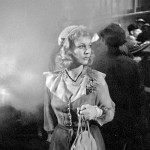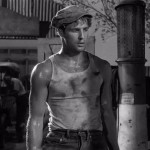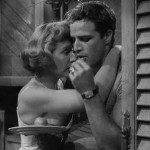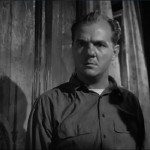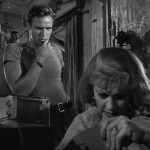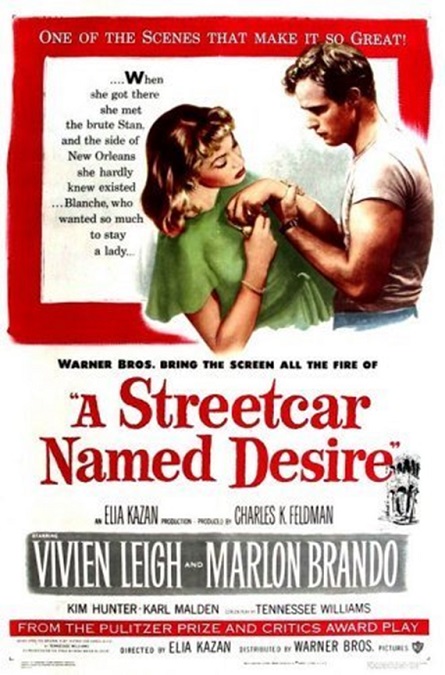
A Streetcar Named Desire – 1951
The first word that comes to mind when I recall watching this film is sleazy. It was so appropriately seedy and base. You could almost smell the dirty sweat and grease in the projects of New Orleans, where the story took place. The movie starred Marlon Brando, Vivian Leigh, Kim Hunter, and Karl Malden as the poor and wretched people living in those filthy slums. It was a rough and violent place, but one that was all too real.
Leigh is a Blanche DuBois, a Southern Belle who has fallen on hard times, so she has to move in with her sister, Stella, played by Hunter, and her terror of a husband, Stanley, played by Brando. Blanche’s past is something that she hides, ferociously guarding her dirty little secrets. She puts on the frilly and flowery airs of her affluent, southern ancestry. Stanley, though, is a violent, bully, without an ounce of sensitivity in him. He sees right through Blanche’s affectations.
The two of them butt heads from their first meeting. Stella, who is pregnant, does her best to be a mediator and keep them away from each other’s throats, but Stanley’s temper can’t be controlled. Malden plays Mitch, one of Stanley’s poker buddies that falls in love with Blanch and her genteel mannerisms.
Stanley’s cruelty toward Blanche comes to a head when he investigates her past on his own. He finds that she had a history of mental instability and sexual promiscuity, even going so far as to have an affair with a 17 year-old student, for which she is fired from her teaching job. Stanley ruins the relationship between Mitch and Blanch by telling Mitch about all of Blanche’s skeletons.
The plot is complex and deep and the cast of actors did a fine job of bringing out the essences of the larger than life characters. And it is no wonder they all did so well. Brando, Hunter, and Malden had all originated their roles on Broadway in the original play, while Leigh was brought in from the London Theatre production to play Blanche. They were all fantastic and worked well together as an ensemble.
The look and atmosphere were very real, as were the characters. The dialogue, while a bit flowery and verbose at times, was deep and meaningful. The author of the original play, Tennessee Williams, who also penned such other hard-hitting dramas as The Glass Menagerie, The Rose Tattoo, and Cat On a Hot Tin Roof, obviously had a talent for writing wonderful and complex characters with which many people could identify.
I’d like to take a moment to focus on Malden’s portrayal of Mitch. The character was a stand-out to me. He showcased, through his mild mannerisms, his shy hesitance, and his hopeful yet desperate need for companionship, inner pains, and conflicts of the role. Malden did a fantastic job, and took home the Oscar for Best Supporting Actor for his work. In fact, both Hunter and Leigh took home Awards for Best Supporting Actress and Best Actress, respectively, as well. Brando was nominated, but he did not win. He lost to Humphry Bogart in The African Queen. I’ve not seen that film, but I have heard that Bogart was exceptional.
All that brings me around to Brando. When you mention the film A Streetcar Named Desire, Brando is the first actor that comes to most people’s minds. It was the movie that really elevated him to the level of the superstar. The famous line in which he is screaming Stella’s name over and over again is much more impactful now that I understand the context from which it came. He has just gotten into a drunken fight, during which, he accidentally hits his wife. She runs to the upstairs neighbor’s apartment as he stands on the ground in tears, shouting her name. It is actually a very moving scene that really proved how much he loved his wife.
Of course, that particular character development only makes the rape scene even that much more confusing. After Stanley confronts Blanche with his knowledge of her past, he rapes her and has her taken away to spend the rest of her life in a mental hospital. It was an act that was part in character, and part not.
The film was good and the acting was first rate. Sure, it was a bit of a downer, but who doesn’t enjoy a good depressing drama from time to time. And why not? Williams seemed to have a knack for writing harsh dramas, and this one translated very well from the stage to the big screen.
